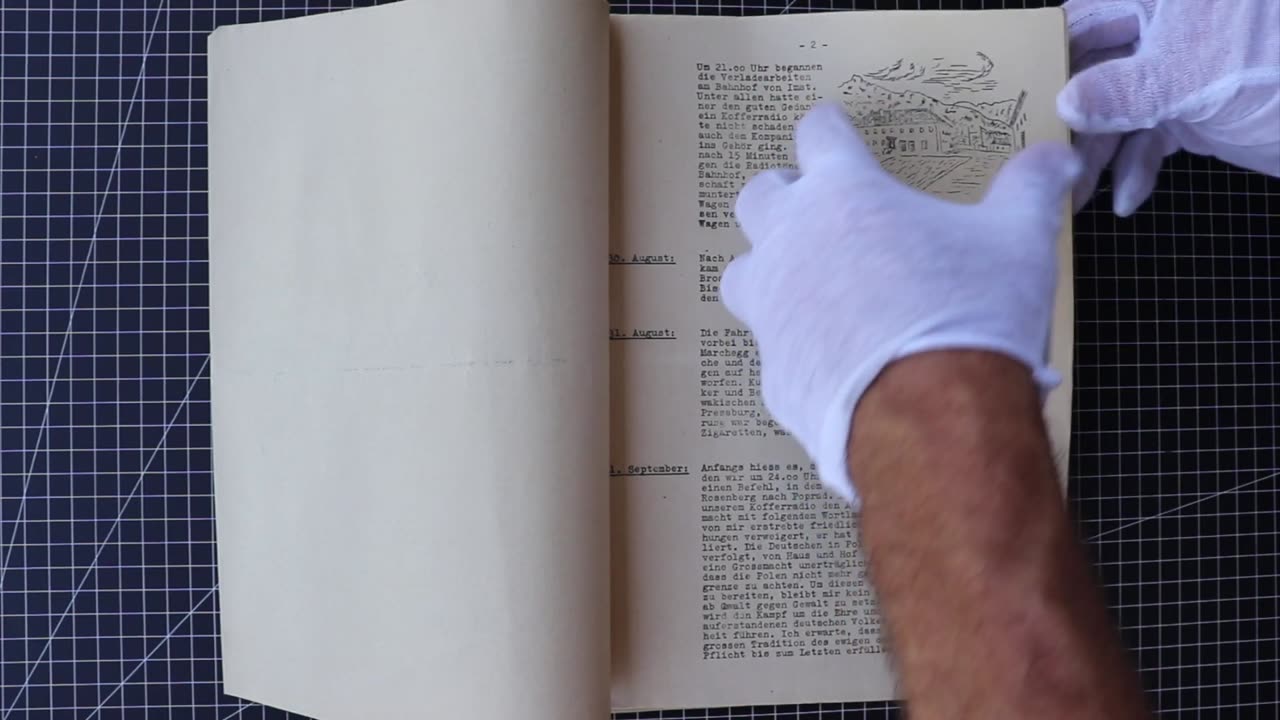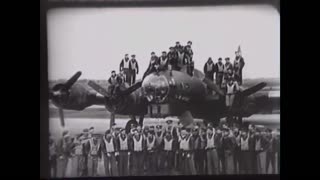Premium Only Content

2nd Mountain Division Regiment 136 - Invasion of Poland 1939 - Hitler Oath - Moltov Ribbontrop Pact
SUPPORT THE CHANNEL
www.Patreon.com/Military1945
Original collection for sale
This is an original collection that contains a nice 15-page-diary from a member of the Gebirgsjäger Regiment 136 that was part of the 2nd Gebirgs-Division. It describes in detail the units participation in Fall Weiss, the German invasion of Poland which took place on September 1, 1939. Along with the diary came a beautiful, large format map of the Eastern part of Germany and Poland.
An interesting aspect of this unit is that just about a year before they were the Austrian Tiroler Jäger-Regiment, a formation with plenty of tradition and its loyalty pledged to another country.
The diary begins on August 26, as the soldiers of the regiment are officially mobilized. This process is described in detail. The officers give specifics about how the campaign is to be waged including contact with the enemy, the treatment of captured enemy soldiers, civilians, personal hygiene etc. Called up reservists which double the size of the regiment are sworn in.
On Aug. 29 Regiment 136 begins its journey by train eastwards on August 30 passing through Vienna. Crossing former Czech border a multitude of defensive positions and fortifications can be seen.
One of the German landers has brought along a portable radio and on Sept. 1 the regiment listens to the Führer’s broadcast speech which attempts to justify the war.
Close to the Polish border the soldiers get off the train and the days of marching begins. On September 3 at 16.00 hours they arrive to the border and the unit is ordered to be combat ready for the first time.
The first bridge they arrive to has been blown and precious time is lost as pioneers build a pontoon bridge. At the second bridge a group of civilians is found hard at work preparing explosives to do the same. A quick decision is made and the lot of them are hung on the bridge and left as an example to others. In the next video we’ll talk about such war crimes and what the common soldier might have thought about them.
Acts of kindness and respect are also described for example taking the time to burry fallen enemy soldiers honorably. As different cities and towns are passed through the civilians reacted differently. In typical Polish areas the city streets were largely empty and as the mountain troops marched through areas populated by Volksdeutsche, or ethnic Germans, they were wholeheartedly celebrated as liberators.
Next, the lead element of the regiment comes into contact with the enemy resulting in the regiment’s first casualty. The days that follow contain descriptions that cover combat operations that the regiment was involved in.
Significant are the descriptions of columns of captured soldiers and separated groups of detained Polish jews that are being lead by armed guards to the rear. In this diary entry and others it’s evident that the author finds it noteworthy but neither unusual nor worrying to see that the jews are being singled out for special treatment.
On September 18, after 18 days of forced march the unit was given an entire days rest which included the cleaning of the weapons, washing and shaving, and lounging around and reading the newly arrived post.
Continuing with the advance the following day the Regiment passes through the Polish city of Rudki which has been damaged extensively by street fighting, German artillery and bomber attacks. The importance of stopping the civilians from scavenging through the ruins is described.
The farther east the unit marches the poorer the condition of the roads becomes and the soldiers are in a constant struggle to protect themselves from the clouds of dust. Progress is slow.
On September 19th, Regiment 136 begins the long march towards Lemberg, or Lwow, and in the afternoon the main road that approaches the city from the south is reached. Traveling on this modern road they march 36 km and then make camp for the night, only 18 km from the city limits. Throughout the night the soldiers have trouble sleeping as strong barrages of artillery continued in the vicinity of the city.
Early in the morning, before continuing with their march. The captain explains the type of street fighting that regiment should expect to encounter and then they make off. About 12 km outside of the city the unit comes into contact with Soviet soldiers. Orders arrive and the soldiers are surprised to learn that they are supposed to turn around and march back the way that they had come.
By September 30 the unit had arrived to its new quarters in the city of Dynow on the San river where it would be responsible for doing occupation duty. This included controlling the movement of Polish refugees and Jews who were moving East out of Germany. Semi permanent quarters were confiscated which made sleeping much more comfortable than being out in the field, and the quality of food they were provided with improved. On 22 of October they were relieved of their occupational duties.
-
 8:25
8:25
Military1945
5 months agoDie Wehrmacht 1944 Nr 4 Pt 2 - Air Defence - Flak 88 - FW 190 - Me 109 - Goering - 8th Air Force
1401 -
 2:04:21
2:04:21
vivafrei
23 hours agoEp. 278: D.C. Peace Wave! Big Tish & Nipple Judge SPANKED! "Maryland Man" Trafficker FREE & MORE?
57.8K57 -
 LIVE
LIVE
RaikenNight
1 hour agoGoose Goose Duck then I am Building MInis
74 watching -
 11:52
11:52
Exploring With Nug
2 hours ago $0.07 earnedWhat’s Hiding Under This Dallas Lake We Found a Vehicle!
14.6K3 -
 LIVE
LIVE
Phyxicx
3 hours agoRocket League with Rance tonight! - 8/24/2025
48 watching -
 LIVE
LIVE
ManoloCalifas
52 minutes ago🔴 LIVE - DARK SOULS 3 SEAMLESS CO-OP
26 watching -
 2:59:09
2:59:09
Barry Cunningham
8 hours agoBREAKING NEWS: PRESIDENT TRUMP SET TO TAKEOVER CHICAGO AND BOSTON!
33K28 -
 2:58:27
2:58:27
LumpyPotatoX2
3 hours agoSunday Funday on HellDivers - #RumbleGaming
19.5K -
 3:11:52
3:11:52
Esports Awards
6 hours agoEsports Awards: Decade Awards 2025
54.1K4 -
 1:02:58
1:02:58
Sarah Westall
4 hours agoMILITARY WHISTLEBLOWER: How Social Media Military Level Psyops are Manipulating You w/ Patrick Bergy
29K7